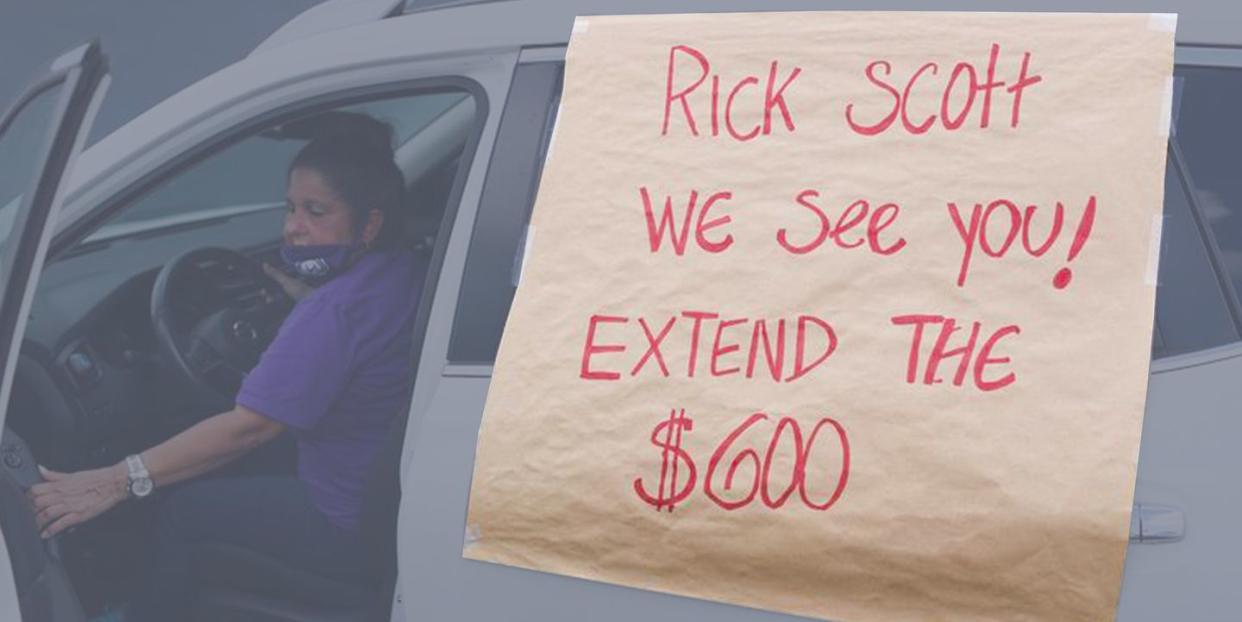If You Want to See How Bad Things Can Get, Roll Back the Unemployment Assistance

It's hard to look away from the spasm of American fascism currently underway on the streets of Portland, Oregon, or the eruption of stupidity out of the governor's office in Georgia. But a growing number of this country's citizens are also facing a financial cliff that threatens to upend their lives and kick off a new and debilitating phase of this charming year. The centerpiece of the federal government's response to the economic fallout of the novel coronavirus pandemic—the $600 weekly boost to unemployment benefits as part of the CARES Act—is set to expire next week, and it will plunge millions of already suffering people into deeper despair, and possibly cast them onto the street.
After all, the country is currently seeing a surge in evictions that advocates say could soon be an "avalanche." Eviction moratoriums are expiring, including in jurisdictions that have failed to get the virus under control. Throwing someone out of their home during a pandemic is a moral abomination, but it's also a practical absurdity. The situation has not hugely changed since April, when the movement to cancel rent was growing in New York City and beyond, and the possibility of widespread rent strikes towards that aim were gaining steam. The fact is that many people just cannot pay, and it's not because they don't want to work. The United States economy contracted again last quarter, to make for 6.6 percent on the year. The ruling regime seems to have just given up trying to fight the pandemic. The house will be on fire for the foreseeable future. The economy cannot actually recover in these conditions. It's delusion.

Meanwhile, more than 5 million Americans have lost their healthcare coverage during this pandemic, a time in which it could be useful. Many will have been among the over 17 million people who are now unemployed. While things have improved since May, the unemployment rate still stands at 11.1 percent, the worst state of affairs since World War II. 1.3 million filed in the week ending July 11, and in this country, losing your job can mean losing your healthcare. This is, again, a national disgrace, and ought to hasten the arrival of Medicare For All, which would decouple people's health coverage from their employment. But for now it will just lead to misery.
The most straightforward solution is to extend the beefed-up unemployment benefits on the basis that the crisis they were implemented to mitigate is still ongoing—and more than likely getting worse. Not only is it the humane thing to do, but also people living paycheck to paycheck, as so many Americans are, spend their money when they have it. The engine of this economy, like it or not, is consumption. Food banks are already under strain, and are anticipating a surge of need. This is no time to worry about whether folks will be "disincentivized" to go back to work if they're getting better unemployment benefits. Again, the house is on fire. And moreover, if you're offended by the government spending money to make people's lives a little less miserable, you better support raising the minimum wage so that they can afford to live on the fruits of the labor they perform for private enterprises. Otherwise, it sounds like you just want a reliable source of cheap labor.
You would think the president and Republicans in Congress would be eager to pump some more money into the economy. They're cratering in the polls and have repeatedly demonstrated they have little real concern about The National Debt. Mitch McConnell has showed some movement on this front, but we've got a ways to go. The fact is that most major nations have navigated not just the pandemic, but also the accompanying economic turmoil, far better than the world's richest country has. If we continue on the current path—allowing the virus to spread out of control while rolling back government assistance and allowing huge numbers of people to lose their healthcare and their homes—it may become genuinely unsustainable. It's the stuff revolutions are made of.
You Might Also Like

